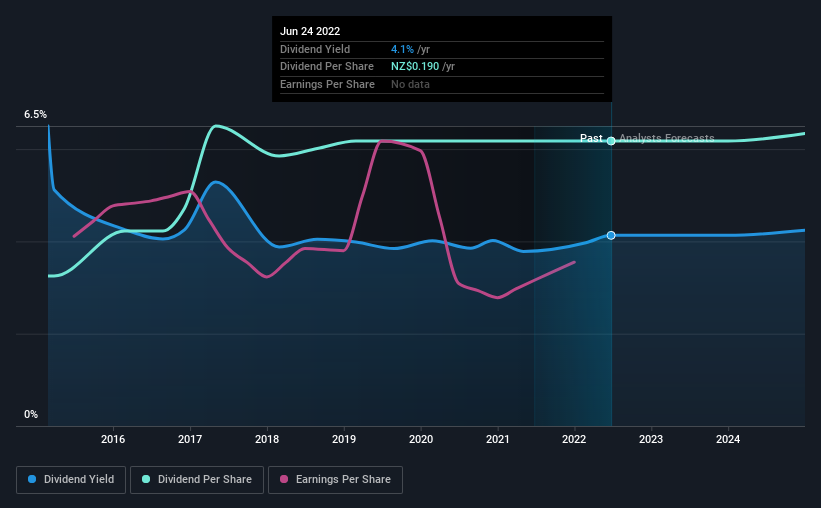Why It Might Not Make Sense To Buy Scales Corporation Limited (NZSE:SCL) For Its Upcoming Dividend
Some investors rely on dividends for growing their wealth, and if you're one of those dividend sleuths, you might be intrigued to know that Scales Corporation Limited (NZSE:SCL) is about to go ex-dividend in just 4 days. The ex-dividend date is one business day before the record date, which is the cut-off date for shareholders to be present on the company's books to be eligible for a dividend payment. The ex-dividend date is important because any transaction on a stock needs to have been settled before the record date in order to be eligible for a dividend. Accordingly, Scales investors that purchase the stock on or after the 29th of June will not receive the dividend, which will be paid on the 8th of July.
The company's upcoming dividend is NZ$0.11 a share, following on from the last 12 months, when the company distributed a total of NZ$0.19 per share to shareholders. Last year's total dividend payments show that Scales has a trailing yield of 4.1% on the current share price of NZ$4.6. Dividends are a major contributor to investment returns for long term holders, but only if the dividend continues to be paid. As a result, readers should always check whether Scales has been able to grow its dividends, or if the dividend might be cut.
View our latest analysis for Scales
Dividends are usually paid out of company profits, so if a company pays out more than it earned then its dividend is usually at greater risk of being cut. Last year Scales paid out 99% of its profits as dividends to shareholders, suggesting the dividend is not well covered by earnings. A useful secondary check can be to evaluate whether Scales generated enough free cash flow to afford its dividend. Over the past year it paid out 115% of its free cash flow as dividends, which is uncomfortably high. It's hard to consistently pay out more cash than you generate without either borrowing or using company cash, so we'd wonder how the company justifies this payout level.
Scales does have a large net cash position on the balance sheet, which could fund large dividends for a time, if the company so chose. Still, smart investors know that it is better to assess dividends relative to the cash and profit generated by the business. Paying dividends out of cash on the balance sheet is not long-term sustainable.
Cash is slightly more important than profit from a dividend perspective, but given Scales's payouts were not well covered by either earnings or cash flow, we would be concerned about the sustainability of this dividend.
Click here to see the company's payout ratio, plus analyst estimates of its future dividends.
Have Earnings And Dividends Been Growing?
Businesses with shrinking earnings are tricky from a dividend perspective. Investors love dividends, so if earnings fall and the dividend is reduced, expect a stock to be sold off heavily at the same time. Scales's earnings per share have fallen at approximately 7.2% a year over the previous five years. Ultimately, when earnings per share decline, the size of the pie from which dividends can be paid, shrinks.
Many investors will assess a company's dividend performance by evaluating how much the dividend payments have changed over time. Scales has delivered an average of 9.6% per year annual increase in its dividend, based on the past seven years of dividend payments. That's intriguing, but the combination of growing dividends despite declining earnings can typically only be achieved by paying out a larger percentage of profits. Scales is already paying out a high percentage of its income, so without earnings growth, we're doubtful of whether this dividend will grow much in the future.
Final Takeaway
Is Scales worth buying for its dividend? Not only are earnings per share declining, but Scales is paying out an uncomfortably high percentage of both its earnings and cashflow to shareholders as dividends. This is a clearly suboptimal combination that usually suggests the dividend is at risk of being cut. If not now, then perhaps in the future. It's not that we think Scales is a bad company, but these characteristics don't generally lead to outstanding dividend performance.
Having said that, if you're looking at this stock without much concern for the dividend, you should still be familiar of the risks involved with Scales. For example - Scales has 1 warning sign we think you should be aware of.
If you're in the market for strong dividend payers, we recommend checking our selection of top dividend stocks.
Have feedback on this article? Concerned about the content? Get in touch with us directly. Alternatively, email editorial-team (at) simplywallst.com.
This article by Simply Wall St is general in nature. We provide commentary based on historical data and analyst forecasts only using an unbiased methodology and our articles are not intended to be financial advice. It does not constitute a recommendation to buy or sell any stock, and does not take account of your objectives, or your financial situation. We aim to bring you long-term focused analysis driven by fundamental data. Note that our analysis may not factor in the latest price-sensitive company announcements or qualitative material. Simply Wall St has no position in any stocks mentioned.

 Yahoo Finance
Yahoo Finance 
